
Clematis is a genus of about 380 species within the buttercup family, Ranunculaceae. Their garden hybrids and cultivars have been popular among gardeners, beginning with Clematis 'Jackmanii', a garden staple since 1862; more cultivars are being produced constantly. They are mainly of Chinese and Japanese origin.
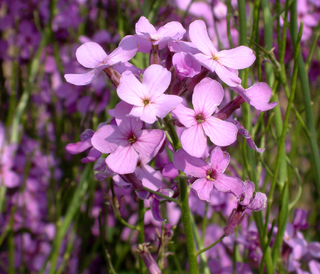
Hesperis matronalis is an herbaceous flowering plant species in the family Brassicaceae. It has numerous common names, including dame's rocket, damask-violet, dame's-violet, dames-wort, dame's gilliflower, night-scented gilliflower, queen's gilliflower, rogue's gilliflower, sweet rocket, and mother-of-the-evening.
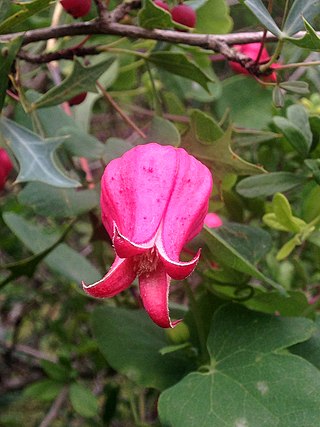
Clematis texensis, commonly called scarlet leather flower, is a climbing vine in the buttercup family (Ranunculaceae). It is native to the United States, where it is endemic to the Edwards Plateau of Texas. Its natural habitat is on rocky limestone cliffs and streamsides.

Paeonia brownii is a low to medium height, herbaceous perennial flowering plant in the family Paeoniaceae. It has compound, steely-gray, somewhat fleshy leaves and small drooping maroon flowers. Its vernacular name is Brown's peony, native peony or western peony. It is native to the western United States and usually grows at altitude, often as undergrowth in part-shade. The fleshy roots store food to carry the plant through the dry summers and produce new leaves and flowers the following spring.

Thalictrum thalictroides, the rue-anemone or windflower, is a herbaceous perennial plant native to woodland in eastern North America. It has white or pink flowers surrounded by a whorl of leaflets, and it blooms in spring.

Emmenanthe penduliflora, known by the common name whispering bells, is a species of flowering plant in the family Boraginaceae. This grassland wildflower is native to California, though it can also be found in other locations within western North America.

Calochortus albus is a North American species in the genus Calochortus in the family Liliaceae. It is also known by the common names fairy lantern, white fairy lantern, pink fairy lantern, lantern of the fairies, globe lily, white globe lily, white globe-tulip, alabaster tulip, Indian bells,satin bells, snowy lily-bell, and snow drops.
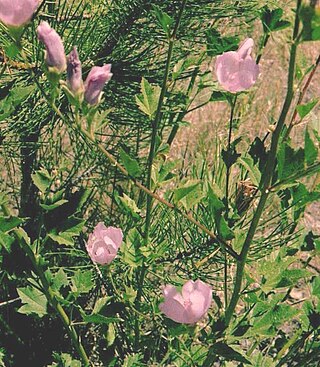
Iliamna bakeri is an uncommon species of flowering plant in the mallow family known by the common names Baker's globe mallow and Baker's wild hollyhock.
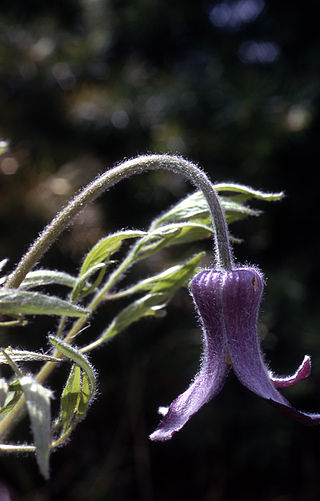
Clematis hirsutissima is a species of flowering plant in the buttercup family known by the common name hairy clematis or vase flower. It is a perennial herb that is native to much of the western United States, from Washington to Nebraska. It is a small, erect plant which, unlike other Clematis, does not generally produce vines. It is quite variable in appearance, especially across varieties. In general the hairy stem reaches up to about half a meter tall and has many large hairy leaves divided into lance-shaped lobes. The inflorescence appears at the tip of the stem and bears a solitary flower. The flower is made up of an urn-shaped cup of deep purple-blue petal like sepals, which are fuzzy and have pointed or rounded tips. Rare individuals have white or pinkish sepals. There are no true petals. The fruit is a hairy achene with a very long beak and a plume on the end; it is dispersed by wind.

Clematis occidentalis is a species of flowering plant in the buttercup family known by the common names western blue virginsbower or purple clematis. It is native to much of southern Canada and the northern United States.
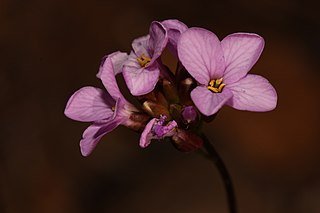
Arabis aculeolata is a species of flowering plant in the mustard family known by the common name Waldo rockcress.

Calochortus nudus is a North American species of flowering plant in the lily family known by the common name naked mariposa lily.
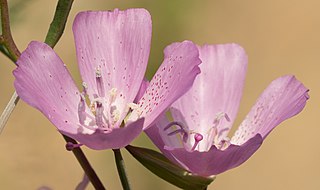
Clarkia dudleyana is a species of flowering plant in the evening primrose family known by the common name Dudley's clarkia. It is endemic to California, where it can be found in the mountains of the Transverse Ranges and the southern Sierra Nevada foothills. It grows in woodland, forest, and chaparral habitats under 1500 meters in elevation. This annual herb produces an erect stem sometimes exceeding half a meter in height. The leaves are lance-shaped, up to 7 centimeters long, and borne on short petioles. The top of the stem is occupied by the inflorescence, which has opening flowers below closed, hanging buds. As the flower blooms the pink to reddish-purple sepals remain fused, opening along one side only. The petals are up to 3 centimeters long, fan-shaped, pinkish lavender in color and sometimes flecked with red. There are 8 stamens, some of which have large lavender anthers and some that have smaller, paler anthers. The stigma protrudes farther than the stamens.

Silene invisa is a species of flowering plant in the family Caryophyllaceae known by the common names red fir catchfly and short-petaled campion.

Clematis morefieldii is a rare species of flowering plant in the buttercup family known by the common names Morefield's leather flower and Huntsville vasevine.

Lilium catesbaei, sometimes known as Catesby's lily, pine lily, leopard lily, tiger lily, or southern-red lily is a native of Florida and the coastal regions of the American Southeast, where it usually grows in damp areas from Louisiana to Virginia.

Dipodium atropurpureum, commonly known as the purple hyacinth orchid, is a mostly leafless mycoheterotrophic orchid that is endemic to New South Wales. In summer it has up to forty dark pinkish purple to reddish purple flowers with darker spots and blotches on a tall flowering stem.
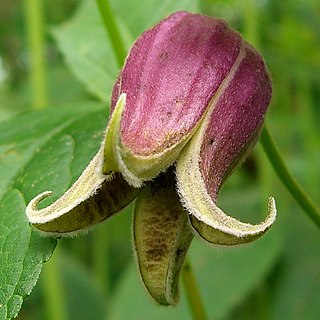
Clematis viorna, commonly known as vasevine or leatherflower, is a flowering vine native to the southeastern United States. It grows in wooded habitats and bears purple flowers in spring and summer.

Ranunculus hispidus is a species of perennial flowering plant in the buttercup family, Ranunculaceae. It is commonly known as bristly buttercup or hispid buttercup. It is a small plant native to central and eastern North America that grows to a height up to 30 cm (1 ft) and has 5-petaled yellow flowers.
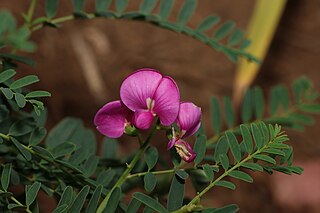
Swainsona queenslandica, commonly known as smooth Darling pea, is a species of flowering plant in the family Fabaceae and is endemic to eastern Australia. It is a perennial herb with imparipinnate leaves with 19 to 25 egg-shaped leaflets with the narrower end toward the base, and racemes of about 20 white, pinkish to orange red or dark red flowers.




















